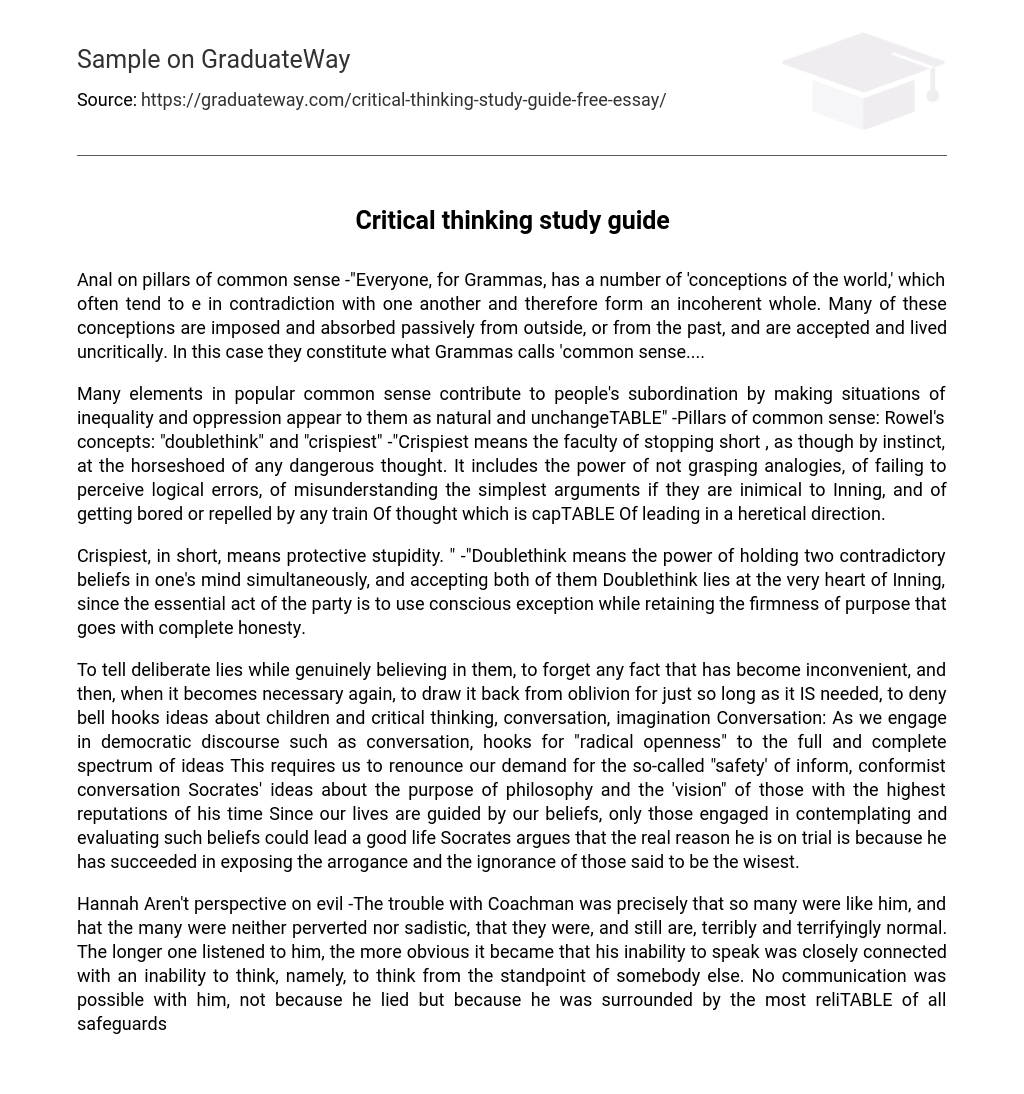Anal on pillars of common sense -“Everyone, for Grammas, has a number of ‘conceptions of the world,’ which often tend to e in contradiction with one another and therefore form an incoherent whole. Many of these conceptions are imposed and absorbed passively from outside, or from the past, and are accepted and lived uncritically. In this case they constitute what Grammas calls ‘common sense….
Many elements in popular common sense contribute to people’s subordination by making situations of inequality and oppression appear to them as natural and unchangeTABLE” -Pillars of common sense: Rowel’s concepts: “doublethink” and “crispiest” -“Crispiest means the faculty of stopping short , as though by instinct, at the horseshoed of any dangerous thought. It includes the power of not grasping analogies, of failing to perceive logical errors, of misunderstanding the simplest arguments if they are inimical to Inning, and of getting bored or repelled by any train Of thought which is capTABLE Of leading in a heretical direction.
Crispiest, in short, means protective stupidity. ” -“Doublethink means the power of holding two contradictory beliefs in one’s mind simultaneously, and accepting both of them Doublethink lies at the very heart of Inning, since the essential act of the party is to use conscious exception while retaining the firmness of purpose that goes with complete honesty.
To tell deliberate lies while genuinely believing in them, to forget any fact that has become inconvenient, and then, when it becomes necessary again, to draw it back from oblivion for just so long as it IS needed, to deny bell hooks ideas about children and critical thinking, conversation, imagination Conversation: As we engage in democratic discourse such as conversation, hooks for “radical openness” to the full and complete spectrum of ideas This requires us to renounce our demand for the so-called “safety’ of inform, conformist conversation Socrates’ ideas about the purpose of philosophy and the ‘vision” of those with the highest reputations of his time Since our lives are guided by our beliefs, only those engaged in contemplating and evaluating such beliefs could lead a good life Socrates argues that the real reason he is on trial is because he has succeeded in exposing the arrogance and the ignorance of those said to be the wisest.
Hannah Aren’t perspective on evil -The trouble with Coachman was precisely that so many were like him, and hat the many were neither perverted nor sadistic, that they were, and still are, terribly and terrifyingly normal. The longer one listened to him, the more obvious it became that his inability to speak was closely connected with an inability to think, namely, to think from the standpoint of somebody else. No communication was possible with him, not because he lied but because he was surrounded by the most reliTABLE of all safeguards against words and the presence Of others, and hence against reality as such. ” Anthony Weston perspective on close-heartiness, stereotypes and self- lifelong prophesies -close-heartiness: “our tendency to forget that the people around us have the same kinds of expectations and needs as we do ourselves.
You played with fire. Therefore, q. Therefore, you got burned. Denying the consequent:: Takes the form “if p, then q” “not q” “therefore not p” example: If God had wanted us to fly, He would have given us wings. Not-q. He has not given us wings. Therefore, not-p. Therefore, He did not want us to fly. Hypothetical syllogism: Takes the form “if p, then q” “if q then r” “therefore, if p, then r” example: If p, then q. If you’re listening to this commercial, then you like football. If q, then p. If you like football, then you’ll love our beer wings bar. Therefore, if p, then r. Therefore, if you’re listening to this and commercial, you’ll love beer and wing bars.
Disjunctive syllogism: Takes the form: “either p or q” “not p” “therefore q” example: Either I will graduate in 1998 or in 1999 will graduate in 1999 I will not graduate in 1 998 Know what a fallacy is Cone’s view of an open society “In an open society, political leaders are not to be dollied and worshipped as gods among humans. Like anyone else, their views can be called into question if they fail to fit the facts as rationally determined. Such a society is antiquarianism, realistic, and democratic in its emphasis on enlightened self-governance. In contrast a closed society is authoritarian, and its leaders lead by demanding blind obedience” Know how to identify fallacies including: Magnifying risks, Inconsistency, Oversimplification, Appeal to Tradition, Smoke screen, Half-truth, False comparison, Fallacy of the Whole, Appeal to power, Fallacy of the part, Straw man, Appeal to Ignorance,





